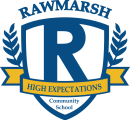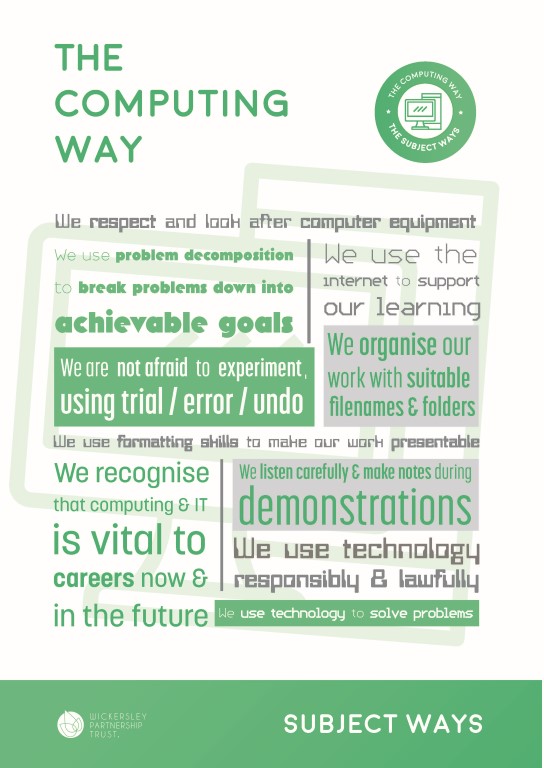Curriculum
Computer Science
Faculty Leader – ICT, Computing & Business
Subject Staff
Mr Treanor
Mrs Cooper
Mr Patel
The Subject Way
Our subject has a ‘Subject Way’ at the heart of it. Our Subject Way is designed to help students become young subject specialists. The Subject Way has two main purposes:
Firstly, to teach students the vital skills they need to achieve their full potential and gain the very best grades they can. Secondly, to teach students how each subject relates to the wider world, incorporating the life skills they will learn.
It is our belief that knowing how what you learn links to the wider world brings a subject to life and therefore improves overall understanding and engagement.
Our Intent
The ICT and Computer Science Curriculum core purpose is to deliver an engaging and challenging curriculum. The curriculum has been developed to respond to rapidly developing/emerging IT technologies in today’s world. The aim of which is to make our students into 21st Century Digital Citizens who are able to learn, communicate and collaborate safely and responsibly using computer technologies. We understand the need for all students to be confident in the use of ICT technologies and the wide role these technologies play in everyday life and career paths. The KS3 curriculum has also been planned to prepare students for KS4 options, we offer students the opportunity to study the OCR Creative iMedia and the OCR GCSE Computer Science Course.
How we intend to remove barriers
Students will be able to use ICT Technologies safely, responsibly and within the confines of the law. As part of this use students will learn how to use the school’s ICT systems and the range of Google Educational Apps. The ICT and Computing curriculum allows students to develop their Literacy and Numeracy skills. Numeracy skills will be developed through the Computing SOWs and Topics we offer. Students will have the opportunity to develop their Oracy skills in every lesson when answering questions or engaging in class discussions.
How we develop skills for learning
Throughout the ICT and Computing Curriculum students will develop creative skills by designing and creating Digital Media Products (Videos, Sounds, Websites and Interactive PowerPoints). Students will also be able to evaluate these products and determine if they are fit for purpose and fit the needs of the project brief/requirements.
In order to develop Analytical skills students will be able to debug broken programming code and be able to correct the errors in order to make the code work correctly. Through the writing of programming code students will develop Logical and Computational Thinking skills.
How we foster personal attributes
Aspects of the Rawmarsh Way are built into the ICT and Computing Curriculum. Students are taught to use ICT equipment safely and responsibly. Students will develop independence skills by undertaking and completing Digital Media projects in the ICT topics. Independence and Resilience skills will also be developed by students learning how to programming code in the Computer Science topics.
Overall, students will be able to develop fundamental ICT skills which will allow them to apply for a range of Higher Education courses or a range of careers, enhancing their employability when they leave Rawmarsh School.
How we intend to enrich student experiences and broaden the horizons of students
Students are given a range of opportunities to broaden their horizons in the ICT and Computing curriculum. Firstly students are taught a wide range of skills using different software packages, some of these packages are industry standard which students wouldn’t normally be able to access at home. The other software packages that we offer are free to use and download, which allow students to install these apps at home to further develop the skills they have learnt in lessons. Theory Topics such as Computer Ethics are planned around real life case studies, allow our students to gain a wider understanding of the world around them. They will also gain an understanding of how ICT technology can impact themselves and society as a whole.
When studying the Computing Topics students will have the opportunity to learn programming techniques in a range of programming language, giving them a wider breath of programming skills and knowledge. The department will also run in lesson workshops where students will have the opportunities to disassemble and reassemble computers in order to learn about how the devices work.
Our Curriculum
In Year 10 students will start to cover theory content of the first unit of the GCSE course. Students will use lesson time in order to learn about Computer Systems. Students will also further develop their programming skills in order to complete the mandatory programming project that is a requirement in the course.
The students will learn the following skills/knowledge over the course of year 10 curriculum:
- Computer Systems
- Memory – RAM / Rom
- Secondary Storage
- LAN and WAN Networks
- Network Topologies
- System Software
- System Security
- Computer Ethics and Laws
In Year 11 students will complete the mandatory programming project and will start to cover theory for the final unit, Unit 2 – Computational Thinking and Programming. After the second unit has been covered the remaining lesson time of the year will be used to revise and teach exam technique.
The students will learn the following skills/knowledge over the course of year 11 curriculum:
- Computational Thinking
- Programming Theory
- Robust Programming Techniques
- Logic Gates
- Translators and Languages
- Data Representation
Find out more
If you would like more information about our curriculum, please contact the school using the details on our contact page.
Our Subjects at KS4
CORE SUBJECTS
EBACC SUBJECTS
OPTION SUBJECTS
INTERVENTIONS




